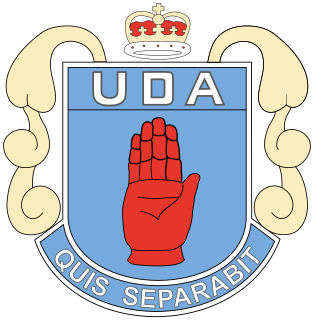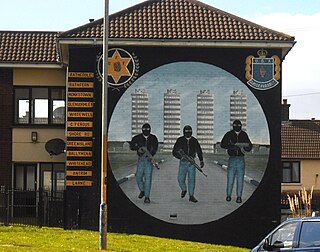
John Adair, better known as Johnny Adair or Mad Dog Adair, is an Ulster loyalist and the former leader of the "C Company", 2nd Battalion Shankill Road, West Belfast Brigade of the Ulster Freedom Fighters (UFF). This was a cover name used by the Ulster Defence Association (UDA), a loyalist paramilitary organisation. In 2002 Adair was expelled from the organisation following a violent internal power struggle. Since 2003, he, his family and a number of supporters have been forced to leave Northern Ireland by the mainstream UDA.

The Ulster Defence Association (UDA) is an Ulster loyalist paramilitary group in Northern Ireland. It was formed in September 1971 as an umbrella group for various loyalist groups and undertook an armed campaign of almost twenty-four years as one of the participants of the Troubles. Its declared goal was to defend Ulster Protestant loyalist areas and to combat Irish republicanism, particularly the Provisional Irish Republican Army (IRA). In the 1970s, uniformed UDA members openly patrolled these areas armed with batons and held large marches and rallies. Within the UDA was a group tasked with launching paramilitary attacks; it used the cover name Ulster Freedom Fighters (UFF) so that the UDA would not be outlawed. The British government outlawed the UFF in November 1973, but the UDA itself was not proscribed as a terrorist group until August 1992.
The Ulster Political Research Group is an advisory body connected to the Ulster Defence Association (UDA), providing advice to them on political matters. The group was permanently founded in January 2002, and is largely a successor to the Ulster Democratic Party.

Andrew Samuel Duddy, known as Sammy, was a Northern Irish loyalist, having joined the Ulster Defence Association (UDA) shortly after its formation in 1971. He later became a leading member of the Ulster Political Research Group (UPRG), which provided political advice to that organisation.
Frank McCoubrey is a Unionist politician and loyalist in Northern Ireland, as well as a community activist and researcher. He is a leading member of the Ulster Political Research Group (UPRG) and a member of Belfast City Council, representing the Court area as a Democratic Unionist Party (DUP) councillor. McCoubrey is a native of Highfield, Belfast.
John White is a former leading loyalist in Northern Ireland. He was sometimes known by the nickname 'Coco'. White was a leading figure in the loyalist paramilitary group, the Ulster Defence Association (UDA) and, following a prison sentence for murder, entered politics as a central figure in the Ulster Democratic Party (UDP). Always a close ally of Johnny Adair, White was run out of Northern Ireland when Adair fell from grace and is no longer involved in loyalist activism.
Raymond "Ray" Smallwoods was a Northern Ireland politician and sometime leader of the Ulster Democratic Party. A leading member of John McMichael's South Belfast Brigade of the Ulster Defence Association (UDA), Smallwoods later served as a leading adviser to the UDA's Inner Council. He was killed by the Provisional Irish Republican Army (IRA) outside his Lisburn home.

John "Big John" McMichael was a leading Northern Ireland loyalist who rose to become the most prominent and charismatic figure within the Ulster Defence Association (UDA) as the Deputy Commander and leader of its South Belfast Brigade. He was also commander of the organisation's cover name, the "Ulster Freedom Fighters" (UFF), overseeing an assassination campaign against prominent republican figures whose details were included in a notorious "shopping list" derived from leaked security forces documents. The UDA used the UFF name when it wished to claim responsibility for attacks, thus allowing it to remain a legal paramilitary organisation until August 1992 when it was proscribed by the British Government.
Gary McMichael is a Northern Ireland community activist, and retired politician. He was the leader of the short-lived Ulster Democratic Party (UDP) during the Northern Ireland peace process, and was instrumental in organizing the Loyalist ceasefire in the Troubles in 1994.
The Combined Loyalist Military Command is an umbrella body for loyalist paramilitary groups in Northern Ireland set up in the early 1990s, recalling the earlier Ulster Army Council and Ulster Loyalist Central Co-ordinating Committee.

John Gregg was a senior member of the UDA/UFF loyalist paramilitary organisation in Northern Ireland. In 1984, Gregg seriously wounded Sinn Féin president Gerry Adams in an assassination attempt. From the 1990s until he was shot dead in 2003 by rival associates, Gregg served as brigadier of the UDA's South East Antrim Brigade. Widely known as a man with a fearsome reputation, Gregg was considered a "hawk" in some loyalist circles.

John "Jackie" McDonald is a senior Northern Irish loyalist and the incumbent Ulster Defence Association (UDA) brigadier for South Belfast, having been promoted to the rank by former UDA commander Andy Tyrie in 1988, following John McMichael's killing by the Provisional IRA in December 1987. He is also a member of the organisation's Inner Council and the spokesman for the Ulster Political Research Group (UPRG), the UDA's political advisory body.
Tommy Kirkham is a Northern Ireland loyalist political figure and former councillor. Beginning his political career with the Democratic Unionist Party, he was then associated with the Ulster Defence Association (UDA) and the Ulster Political Research Group although he has since been expelled from both groups. He was a former deputy mayor of Newtownabbey and sat on Newtownabbey Borough Council as an Independent Loyalist.
Andrew Tyrie is an Ulster loyalist paramilitary leader who served as commander of the Ulster Defence Association (UDA) during much of its early history. He took the place of Tommy Herron in 1973 when the latter was killed, and led the organisation until March 1988 when an attempt on his life forced him to resign from his command.

The UDA South East Antrim Brigade was previously one of the six brigades of the Ulster Defence Association (UDA) and are heavily involved in the drug trade. It is claimed they control "100%" of an illegal drugs network in south-east Antrim, Northern Ireland. A mural in support of the group lists its areas of activity as being Rathcoole, Rathfern, Monkstown, Glengormley and Whitewell, all of which are part of Newtownabbey, as well as Carrickfergus, the Shore Road, Greenisland, Ballymena, Whitehead, Antrim and Larne. A newer mural in the Cloughfern area of Newtownabbey and flags have updated the areas to include Ballycarry, Ballyclare, the rural hinterland of Ballymena called 'Braidside' and despite not being in County Antrim, the town of Newtownards. The Guardian has identified it as "one of the most dangerous factions". The Irish News described the brigade as 'powerful' and at one time being 'the most bloody and murderous gang operating within the paramilitary organisation'. Since 2007 the South East Antrim Brigade has operated independently of the UDA following a fall-out.

Frankie Curry nicknamed "Pigface", was an Ulster loyalist who was involved with a number of paramilitary groups during his long career. A critic of the Northern Ireland peace process, Curry was killed during a loyalist feud.

Kenneth Gibson was a Northern Irish politician who was the Chairman of the Volunteer Political Party (VPP), which he had helped to form in 1974. He also served as a spokesman and Chief of Staff of the loyalist paramilitary organisation, the Ulster Volunteer Force (UVF).
David Adams is a Northern Irish loyalist activist and former politician. He was instrumental in bringing about the loyalist ceasefire of 1994 and played a leading role in the early stages of the Northern Ireland peace process.
William Elliot was a former Northern Irish loyalist who served as brigadier of the Ulster Defence Association's (UDA) East Belfast Brigade in the 1980s.
Samuel Smyth was a Northern Irish loyalist activist. A founder member of the Ulster Defence Association (UDA) he was the early public face of the movement as the organisation's spokesman, and he later became involved in the group's attempts to politicise. He was assassinated by the Provisional IRA as part of the Troubles. Author Steve Bruce described Smyth as the "sometime editor of the Ulster Militant and a loose cannon who enjoyed an exciting and erratic relationship with the UDA".









